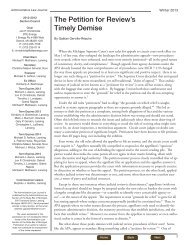目 录
TABLE OF CONTENTS - Warner Norcross & Judd LLP
TABLE OF CONTENTS - Warner Norcross & Judd LLP
- No tags were found...
Create successful ePaper yourself
Turn your PDF publications into a flip-book with our unique Google optimized e-Paper software.
Financing Operations in MichiganIt is typical for new businesses to be funded initially by capital investments, including cash infusions or contributions ofequipment, machinery and technology to the business. In the case of foreign investment, the Chinese parent companymay contribute capital, and it may also loan operating funds to the U.S. subsidiary via an inter-company loan underwhich the U.S. subsidiary will make payments of capital and interest to the Chinese parent.For companies seeking debt financing, there are a number of state, regional and national banks and leasing companies operating inMichigan. Many of them have Chinese-speaking managerial employees who can explain available financing and terms to Chineseclients. Banks in the U.S. might require that Chinese parent companies guarantee bank loans to their newly-created U.S. subsidiaries.Because many banks operating in Michigan have liaison relationships with Chinese banks, a Chinese company seeking debt fundingshould consult with its main Chinese bank services provider regarding relationships it might have with banks in Michigan. Anintroduction from a reputable Chinese bank can be an efficient way to begin a new relationship with a bank in Michigan.In addition to self-funding of capital and bank loans, Chinese companies may consider funding initial U.S. operations in the U.S.partially with local investor capital. For example, some companies will establish a joint venture with a Michigan company that willagree to share the burden of initial capitalization or help in securing bank financing. Venture capitalists also might offer fundingin the form of equity in exchange for ownership shares. While joint venture partners and venture capitalists are sometimes silentinvestors, more often they will require informational rights, and some degree of control. Accordingly, before considering third partyequity financing, Chinese companies must strongly consider the potential loss of control to such third party investors, and determinewhether the loss of control is outweighed by any benefits that an investor may bring to the company.The Michigan Economic Development Corp. can provide further details regarding public funding that may be availableto Chinese companies establishing operations in Michigan.Buying and Selling Products/ServicesThe terms of buyer and seller transactions are generally determined by private negotiations and agreements betweenprivate parties. With the exception of sales of certain materials and goods and the provision of certain professionalservices, businesses in the U.S. are generally subject to few special regulations.Doing business in MichiganThe Michigan version of the Uniform Commercial Code applies to the sale of goods in Michigan. The United NationsConvention on Contracts for the International Sale of Goods may apply to certain sales of goods internationally,depending on what the parties stipulate in their agreements. Service contracts are generally governed by Michigancommon law, which is the law established by judicial decisions.U.S. contracts may vary from the contract that Chinese companies may be used to in their own country and tend to be muchmore detailed. For example, in addition to specifying business terms, U.S. contracts tend to address other matters such astermination rights, remedies for failure to perform, limitations on the amount and types of damages payable, specification ofthe forum for dispute resolution (such as by court or by arbitration) and the governing law of the contract. Accordingly, itis advisable that a Chinese company not only review contracts in detail, but also develop a relationship with a legal counsel.A Chinese company should consult with its legal counsel before entering contracts, particularly contracts such as those thatdetermine the following: long-term supply or purchase obligations; exclusivity for sales and distribution territories; obligationsto pay commissions or royalties; licenses of intellectual property or know-how; purchases and sales or leases of real estate;non-compete provisions; and confidentiality agreements or non-disclosure and non-use agreements.23




